Google Nexus is a discontinued line of consumer electronic devices that run the Android operating system. Google managed the design, development, marketing, and support of these devices, but some development and all manufacturing were carried out by partnering with original equipment manufacturers (OEMs). Alongside the main smartphone products, the line also included tablet computers and streaming media players; the Nexus started out in January 2010 and reached its end in October 2016, replaced by Google Pixel.
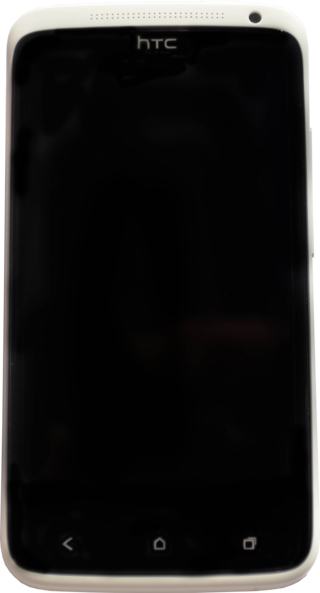
The HTC One X is a touchscreen-based, slate-sized smartphone designed and manufactured by HTC. It was released running Android 4.0.3, with the HTC Sense 4.0 skin. The One X is powered by the NVIDIA Tegra 3 for most international GSM carriers, making this the first HTC phone to be equipped with a quad-core processor, while a variant which is LTE capable is powered by the Qualcomm Snapdragon S4 dual-core 1.5 GHz Krait processor. The One X was announced on February 26, 2012, at the Mobile World Congress and was HTC's sixth flagship product, leading the HTC One series from the time of its release through April 2013, when its successor the HTC One (M7) was announced.

The HTC One S is a premium smartphone designed and manufactured by HTC as part of the HTC One series which has Beats Audio and runs the Android 4.0 "Ice Cream Sandwich" mobile operating system with HTC Sense. Announced by HTC on 26 February 2012, the HTC One S was scheduled for official release on 2 April 2012. The first phones were sold on March 30. In the United States, the One S is carried by T-Mobile and Solavei.

The HTC Evo 4G LTE is an Android smartphone developed by HTC Corporation to be released exclusively by Sprint. A successor to the previous HTC Evo 4G and 3D models, the Evo 4G LTE supports Sprint's LTE cellular network and its current-generation EV-DO network. The Evo 4G LTE shares features with its GSM counterpart, the HTC One X—such as the same dual-core 1.5 GHz processor used by the One X's LTE variant, a 4.7-inch screen, and Android 4.1 with HTC's Sense 4.0 interface. The Evo 4G LTE was also the first phone built with an all aluminum frame, leaving only a small plastic piece to allow the Sim and micro sd cards to be installed.
HTC One is a series of Android and Windows Phone smartphones designed and manufactured by HTC. All products in the One series were designed to be touchscreen-based and slate-sized, and to initially run the Android mobile operating system with the HTC Sense graphical user interface. The one exception to this is the HTC One (M8), which also had a Windows Phone variant. From 2010 to 2013, all HTC products starting from the HTC Sensation XE to the HTC One Mini were equipped with a Beats Audio equalizer. Later HTC devices beginning with the HTC One Max no longer ship with Beats Audio following the buyback of HTC's stake in Beats Electronics.
The Droid Incredible 4G LTE, also known as the HTC Incredible 4G or Incredible 3, is a smartphone designed and manufactured by Taiwan's HTC Corporation that runs the Android 4.0 operating system (ICS). Officially announced by Verizon on May 7, 2012, for CTIA, and released on July 5, 2012, through Verizon Wireless for $149.99 with a new two-year contract. The Droid Incredible 4G LTE is the successor to the HTC Incredible S.

The Samsung Galaxy S series is a line of flagship Android smartphone and tablet computer produced by Samsung Electronics. In conjunction with the foldable Galaxy Z series, the lineup serves as Samsung's flagship smartphone lineup.

The HTC Butterfly is an Android-based, 4G LTE-capable smartphone designed and developed by HTC. First announced for release in Japan by Japanese carrier KDDI as the HTC J Butterfly (HTL21), the J Butterfly was released in Japan on 9 December 2012 as the successor to the HTC J. Outside Japan, in other Asian countries, the phone was released as the HTC Butterfly (X920d) and in China and Russia as the HTC Butterfly (X920e). The Chinese/Russian and US versions of the Butterfly do not have a microSD slot. In the United States, the Butterfly was released as the HTC Droid DNA as a Verizon exclusive, supporting wireless charging. The DNA would become Verizon's final non-Motorola Droid smartphone; following its replacement in August 2013 by the HTC One and Droid Maxx, the carrier announced that all future Droid phones would be built exclusively by Motorola. In June 2013, the Butterfly was succeeded by the HTC Butterfly S.
The HTC Rhyme is a multi-touch, slate-format Android 2.3 smartphone designed and produced by HTC. The Rhyme was released in the United States exclusively by Verizon Wireless on September 22, 2011, with releases in Asia and Europe beginning in October 2011. The Rhyme is a mid-range smartphone, distinguished by its use of an updated HTC Sense 3.5 user experience, and a selection of bundled accessories; such as a charging dock, wireless speakers, and an LED "charm" that can be used as a notification light. While it was not explicitly marketed as such by HTC, the Rhyme was primarily developed and targeted towards women.
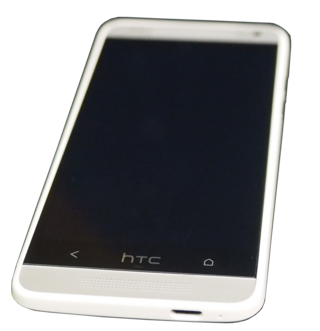
The HTC One Mini is an Android smartphone designed and manufactured by HTC. Alternatively known as the HTC M4, HTC 601e or HTC 601s, the One Mini is a mid-range variant of HTC's 2013 flagship high-end smartphone, the HTC One. As such, the One Mini was designed to provide an overall experience as similar to its high-end counterpart as possible, while still being competitively priced in comparison to other smartphones in its range. Officially unveiled on 18 July 2013, the One Mini was released in selected markets in August 2013 followed by a global release in September 2013.
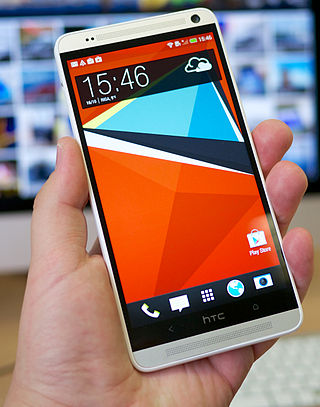
The HTC One Max is an Android phablet smartphone designed and manufactured by HTC. The device is a larger variant of HTC's 2013 flagship high-end smartphone, the HTC One, notably incorporating a 5.9-inch display and fingerprint recognition features.
The HTC Desire 601 is an Android smartphone designed and manufactured by HTC. The Desire 601 is a mid-range device carrying design traits from the HTC One and One Mini, utilizing a dual-core processor, 4.5-inch qHD display, and offering LTE support.

The second-generation Moto G is an Android smartphone developed by Motorola Mobility. Released on September 6, 2014, it is a successor to the original Moto G released in 2013. The phone was initially aimed at developing markets, although it is also available in developed markets as a lower-cost option compared to other phones in its class.
The HTC Desire 620 is an Android-based smartphone designed and manufactured by HTC. It is part of the Desire range of mid-range handsets. It was announced on 29 November 2014 in Taiwan. It was announced for the European market on 9 December 2014.
The HTC Desire 300 is a low-end Android smartphone released by HTC in 2013. The phone was announced on 3 September 2013 in London, England. It was stated that the device would be available in October 2013 in select markets.
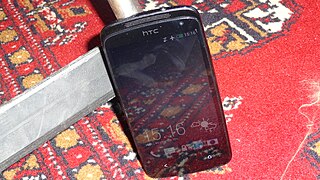
The HTC Desire 500 is a low-mid-range Android smartphone released by HTC in 2013. On 23 July 2013, HTC Desire 500 was announced in Taiwan. On 7 August 2013, the device was unveiled for the European market.
The HTC Desire 626 is a mid-range Android smartphone released by HTC in 2015. It comes in single SIM and dual SIM models.
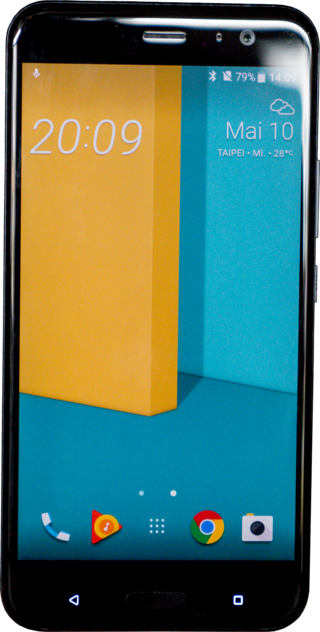
The HTC U11 is an Android smartphone manufactured and sold by HTC as part of the HTC U series. It was announced on 16 May 2017 and succeeds the HTC 10 smartphone. In the United States, the HTC U11's major carrier is Sprint; however, it is also compatible with unlocked carriers, such as AT&T, T-Mobile, and Verizon.
The HTC U series is a line of upper mid-range and high-end flagship Android smartphones developed and produced by HTC. The first phones in the series, the HTC U Play and the HTC U Ultra, were announced in January 2017. The HTC U series is the successor of the HTC One series.
The Xiaomi Mi MIX 3 is an Android smartphone launched in Beijing on 25 October 2018. It is the successor for the Mi MIX 2 and Mi MIX 2S. This time Xiaomi uses a true bezel-less display with a magnetic sliding front camera setup.










